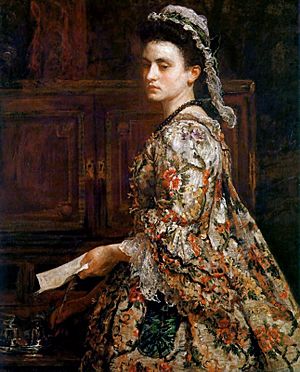Robert Marshall (Irish judge) facts for kids
Robert Marshall (born around 1695, died 1774) was an important judge in Ireland. He is mainly remembered because he was involved with the will of Esther Vanhomrigh. She was known as "Vanessa" and was a close friend of the famous writer Jonathan Swift. Even though Marshall was named in her will, it is believed that he and Vanessa might not have known each other very well, and perhaps never even met.
About Robert Marshall
Robert Marshall was born in Clonmel, a town in County Tipperary, Ireland. His father, John Marshall, was a "gentleman," and his mother was Catherine. Robert went to school at Clonmel Free School and Kilkenny College. In 1718, he started studying law in London at Middle Temple, and by 1723, he became a lawyer in Ireland.
He moved homes several times before he bought a country house in Monkstown, County Dublin. In 1741, he married Mary Wooley, who was a very wealthy heiress. She was the daughter of Benjamin Wooley from East Sheen, near London. It is said that she brought him a large sum of money, about £30,000, as her dowry. Mary died without having children in 1743. Robert lived for another thirty years after her, even though his health was getting worse. He often visited England hoping to find a cure for his illnesses. He was buried in Christ Church Cathedral in Waterford.
His Career in Law and Politics
Robert Marshall became a "Third Serjeant" (a senior type of lawyer) in 1738 and then a "Second Serjeant" in 1741. As a lawyer, he became well-known for his work on a famous court case called the Annesley case. In this case, a man named James Annesley claimed he was the rightful Earl of Anglesey, fighting against his uncle. This case is often thought to have inspired the novel Kidnapped by Robert Louis Stevenson.
Marshall earned a lot of money from his law practice. However, most of his great wealth came from his good marriage to Mary Wooley. He was also a member of the Irish House of Commons, representing Clonmel. He usually supported the government. He also served as the "Recorder" (a type of judge) for Clonmel many times between 1727 and 1747. He was even the Mayor of Clonmel four times. In 1729, he was the High Sheriff of County Tipperary. He also took an interest in the affairs of County Waterford, especially after his sister Elizabeth married Thomas Christmas, who was a Member of Parliament. The Christmas family was very important in Waterford politics for many years. In 1754, Robert Marshall became a judge of the Court of Common Pleas (Ireland). He retired from this role in 1766.
Robert Marshall and "Vanessa"

In 1723, the close friendship between the writer Jonathan Swift and Esther Vanhomrigh, whom he called Vanessa, ended in a big argument. The argument was about another woman Swift had loved for many years, Esther Johnson, whom he nicknamed "Stella." It's possible Swift secretly married Stella in 1716, but we can't know for sure now. The argument happened when Vanessa seemed to ask Swift to stop seeing Stella, and he refused.
Vanessa was very ill with tuberculosis and died a few months later. Before she died, she changed her will. She had originally left her money to Swift, but she made a new will. In this new will, she divided her estate between Robert Marshall and George Berkeley, who later became a famous philosopher and a Bishop. She also named them as the people who would carry out her will.
Her choice of who would receive her money surprised many people. It seems she didn't know either Marshall or Berkeley very well, and they didn't seem to know each other either. Some even think she might never have met them. In the end, much of her estate was lost in a lawsuit. There is a story that Marshall and Berkeley did not follow a part of the will that said they should publish all of Swift's letters to Vanessa. However, it seems no such instruction was actually in the will. Marshall did keep copies of the letters. Swift had no argument with Berkeley, whom he respected. But he thought of Marshall as his enemy and called him a "scoundrel." It's true that Swift generally had a very low opinion of lawyers.
 | Audre Lorde |
 | John Berry Meachum |
 | Ferdinand Lee Barnett |

